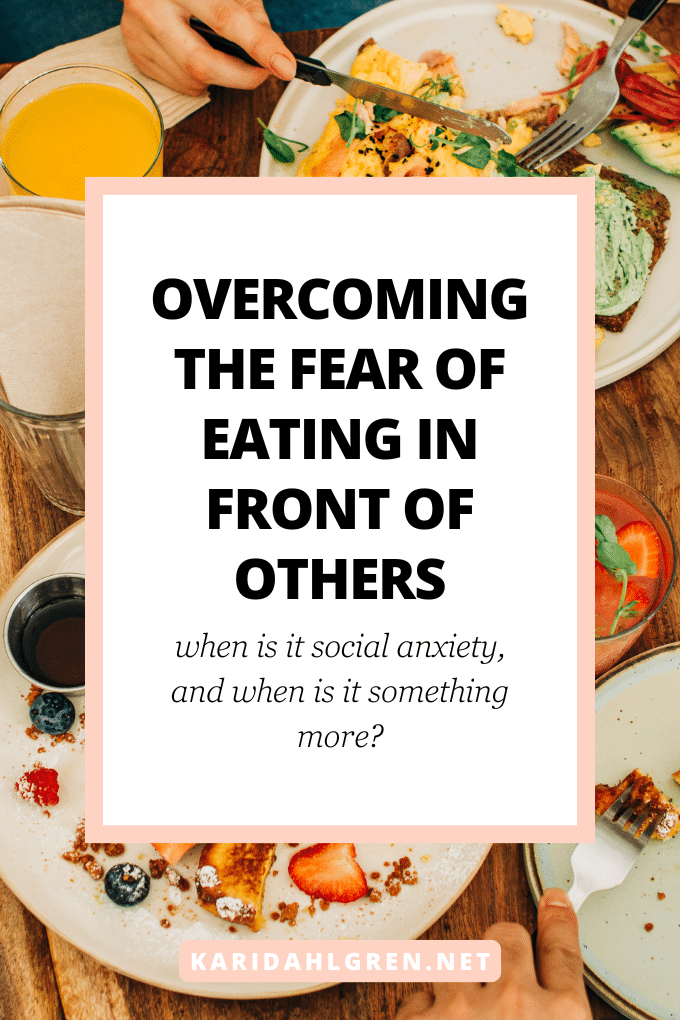
Imagine sitting down at a table surrounded by friends or colleagues, but instead of enjoying the meal and conversation, your heart starts to race, your palms get sweaty, and the mere thought of taking a bite fills you with dread. This scenario is all too familiar for many who struggle with the fear of eating in front of others.
Whether it’s the anxiety of being judged for how you eat, a deep-seated discomfort with social interactions, or a specific fear known as deipnophobia—where the act of dining and conversing feels unbearable—these experiences can make what should be a pleasant occasion a source of immense anxiety and stress.
In this article, we’ll explore the differences between social anxiety, social eating anxiety, and deipnophobia, and why it’s crucial to seek professional help if you’re facing these challenges. If you or someone you know is struggling, consider reaching out to a therapist or a mental health professional who specializes in anxiety disorders for support. The National Alliance on Mental Illnesses (NAMI) is a great resource.
Understanding Social Eating Anxiety and Deipnophobia
Social eating anxiety and deipnophobia are specific manifestations of a broader condition known as social anxiety disorder.
Social Anxiety
In a nutshell: an irrationally strong fear of social situations
According to a review article from StatPearls, a continuously updated collection of peer-reviewed articles, social anxiety disorder is characterized by a marked fear or anxiety in social situations where the individual feels they might be scrutinized or judged negatively by others.[1] This fear can be so intense that it leads individuals to avoid social situations altogether or endure them with extreme discomfort.
Social Eating Anxiety
In a nutshell: an irrationally strong fear of eating in front of others
For those with social eating anxiety, this fear specifically revolves around eating in front of others, often due to concerns about being judged for their eating habits, appearance, or even the act of eating itself. The anxiety can manifest in various settings, from casual meals with friends to formal dining events, significantly impacting your social life and well-being.
Deipnophobia
In a nutshell: a specific phobia that causes an irrational fear of social interactions while dining with others
Deipnophobia, on the other hand, is a more focused condition where the fear is specifically related to dining and the conversations that occur during meals. While social eating anxiety may stem from concerns about eating habits or body image, deipnophobia often arises from a fear of poor table manners, inappropriate conversation, or the pressure to engage in social interaction while eating.
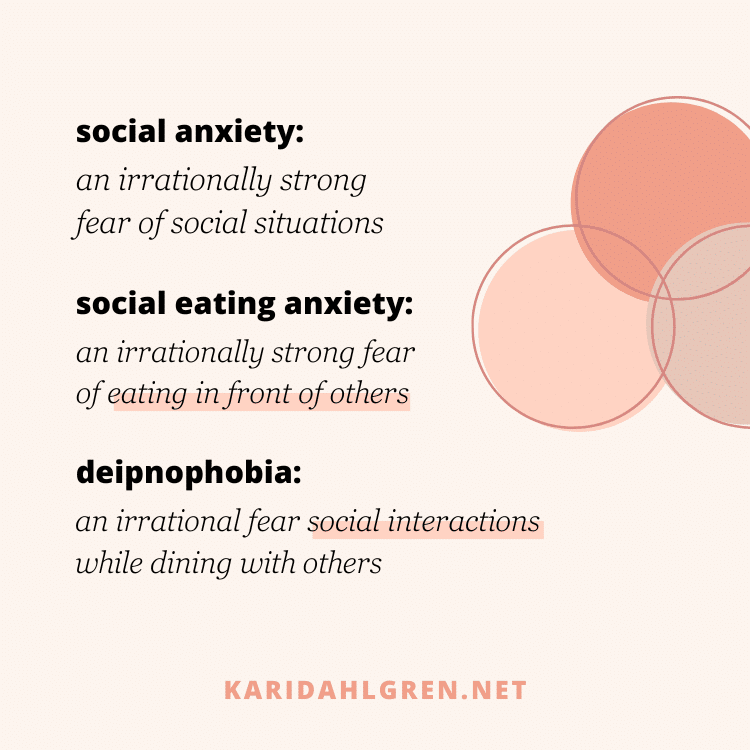
According to the DSM-5, a comprehensive guide used by healthcare professionals to diagnose mental disorders, social eating anxiety and deipnophobia can be understood as specific phobias that provoke immediate fear or anxiety when the individual is exposed to the feared situation—in this case, eating or dining in front of others.[2] The fear is often disproportionate to the actual threat posed by the situation, yet it feels very real and overwhelming to those affected.
For example, a person with social eating anxiety might avoid attending a work lunch out of fear that their eating habits will be judged, while someone with deipnophobia might feel paralyzed at the thought of having to make small talk during a dinner party.
What Triggers the Fear of Eating in Front of Others?
The fear of eating in front of others is often rooted in a combination of psychological, emotional, and social factors. These triggers can vary from person to person, but several common themes emerge. Understanding these triggers can help in recognizing the underlying causes of this fear and addressing them effectively.
Here are common triggers for the fear of eating in front of others:
- Fear of judgment or criticism: Anxiety about how others might judge your eating habits, table manners, or portion size. This fear often leads to discomfort and avoidance of social meals.
- Self-consciousness about eating habits or body image: Feeling insecure about how you eat or how you look while eating can make social dining feel overwhelming.
- Past experiences of being shamed or teased: Negative memories of being ridiculed for your eating habits or appearance can create a lasting fear of eating in front of others.
- Psychological and emotional roots: Often tied to social anxiety disorder, where the fear of judgment in social situations is heightened, making eating in public particularly stressful.
- Low self-esteem and negative body image: If you struggle with confidence in your appearance, the fear of being perceived negatively while eating can intensify.
- Cultural and societal expectations: Pressure to conform to cultural norms around eating and societal focus on body image can increase anxiety about how you are perceived while eating.
In today’s society where many people are dieting and trying to lose weight, social functions that revolve around food can spark fear and anxiety in many people. What sets social anxiety, social eating anxiety, and deipnophobia apart is that the anxiety becomes debilitating and severely interferes with one’s quality of life.
Symptoms of Social Eating Anxiety and Deipnophobia
Social eating anxiety and deipnophobia can manifest through a range of physical, behavioral, and emotional symptoms. Recognizing these symptoms is crucial for understanding the impact these conditions can have on daily life.
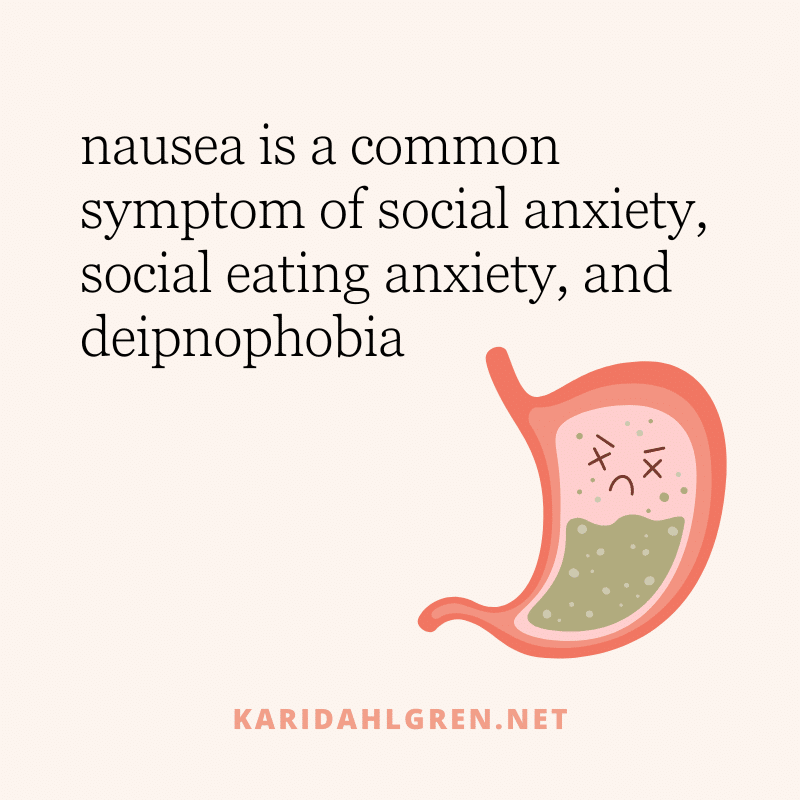
Physical Symptoms: The fear of eating in front of others often triggers physical responses. These might include sweating, trembling, nausea, or an increased heart rate. These symptoms are the body’s natural reaction to perceived stress or threat, making social dining feel overwhelming.
Behavioral Symptoms: To avoid the discomfort, individuals might change their behavior in noticeable ways. This can include avoiding social situations that involve food, such as skipping work lunches or declining dinner invitations. Some might choose to eat in secret or only in private, finding safety in isolation rather than risking judgment from others.
Keep in mind that eating in secret due to the fear of eating in front of others can also overlap with patterns seen in certain eating disorders. Social anxiety disorders and eating disorders often overlap.[3] The isolation and secrecy around food can reinforce unhealthy eating habits and further exacerbate feelings of shame or guilt, making it even more important to seek help from a qualified professional.
Emotional Symptoms: The emotional toll of social eating anxiety and deipnophobia can be significant. Many experience intense fear or dread before meals with others, leading to anticipatory anxiety that can overshadow social interactions. During or after eating, feelings of shame, embarrassment, or even guilt may surface, particularly if the individual believes they did not meet social expectations or fears they were judged.
Exploring the Roots of This Fear
The fear of eating in front of others often stems from a combination of cultural, societal, personal, and psychological factors. Understanding these roots helps in addressing and managing the anxiety and fear of eating in front of others.
- Media portrayal of eating and body image: The media frequently promotes unrealistic standards of beauty and body image, creating pressure to conform. This can lead to self-consciousness about eating in front of others, driven by the fear of not meeting these ideals.
- Diet culture and its effect on social eating norms: Diet culture imposes rigid rules about food, leading to anxiety about eating “correctly” in public. The fear of judgment for food choices can make social dining a source of extreme anxiety.
- Bullying or teasing related to eating habits: Negative experiences, such as being teased or bullied about eating habits or body size, can leave lasting scars. These experiences can contribute to a deep-seated fear of eating in front of others.
- Family dynamics and childhood experiences with food: Growing up in a household where food was associated with conflict, control, or strict rules can create anxiety around eating. These early experiences often carry into adulthood, making social eating situations uncomfortable.
- Perfectionism and the Need for Control: Individuals who are perfectionists may feel an intense need to control every aspect of their eating behavior. The fear of making a mistake or being perceived as imperfect can lead to anxiety in social eating situations.
- Fear of rejection or criticism in social settings: The worry that any misstep while eating could lead to rejection or criticism can be paralyzing. This fear of negative judgment makes social dining feel risky and stressful.
Although I don’t personally struggle with a fear of eating in front of others, I’d like to share a little background on my phobia of food noises. I cringe with a strong recoil reflex whenever I hear anyone smack their lips or crinkle food packaging. It’s not just annoying, it makes me want to curl into a fetal position, and it disrupts my life to the point where I don’t eat in the same room as some people and I avoid the movie theater completely (too much candy and popcorn noises).
For me, the roots come from childhood. One of my parents imposed extremely strict rules around eating silently, which created an anxiety that still persists today. This is not nearly as debilitating as the fear of eating in front of others, but I hope that my story makes the struggle feel more human. There is power in our shared humanity, and I hope that you know you’re not the only one with a unique food-related phobia.
Overcoming the Fear of Eating in Front of Others
Overcoming the fear of eating in front of others involves a multifaceted approach that includes therapy, cognitive-behavioral techniques, mindfulness practices, and building self-esteem. Understanding when to seek help and the various strategies available can empower individuals to manage and eventually overcome this fear.
Know When to Seek Help
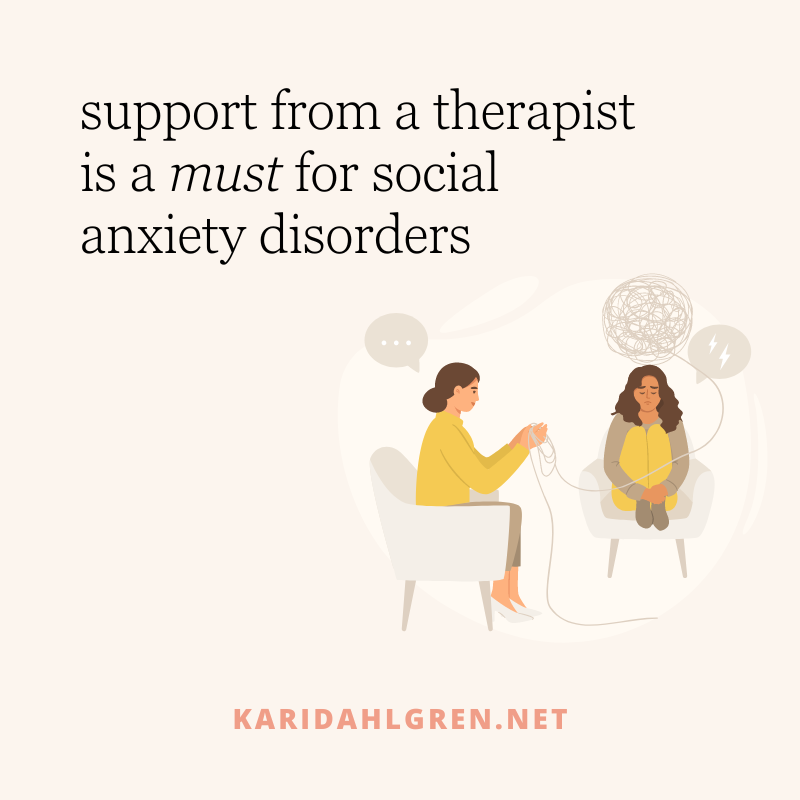
Recognizing when to seek professional help is crucial. If the fear of eating in front of others is significantly impacting your daily life—such as avoiding social events, experiencing intense anxiety around meals, or if it’s affecting your relationships or work—it may be time to consider therapy. Therapy can provide the tools and support needed to address the underlying causes of this fear and develop effective coping mechanisms.
Explore Different Types of Therapy
Several therapeutic approaches can be effective in treating social eating anxiety and deipnophobia:
- Cognitive Behavioral Therapy (CBT): CBT is one of the most effective therapies for anxiety disorders. It focuses on identifying and changing negative thought patterns that contribute to anxiety. Through CBT, individuals learn to challenge their fears and develop healthier ways of thinking about social situations involving food.
- Exposure therapy: Exposure therapy involves gradually exposing individuals to the situations they fear, in this case, eating in front of others. By facing these fears in a controlled and supportive environment, the anxiety associated with these situations can decrease over time.
- Group therapy for social anxiety: Group therapy provides a supportive environment where individuals can share their experiences and learn from others who are dealing with similar issues. It also offers opportunities to practice social eating in a safe and understanding setting.
Talk to Your Doctor or Psychiatrist About Medication
In some cases, medication may be an appropriate option to help manage the symptoms of social eating anxiety and deipnophobia:
- Anti-anxiety medications: These medications can help reduce the immediate symptoms of anxiety, making it easier to engage in social eating situations. However, medication is typically most effective when combined with therapy and other coping strategies.
- When medication may be appropriate: Medication may be considered if the anxiety is severe and significantly impairs daily functioning. It’s important to consult with a healthcare professional to determine the best course of treatment.
Practice Mindfulness and Relaxation Techniques
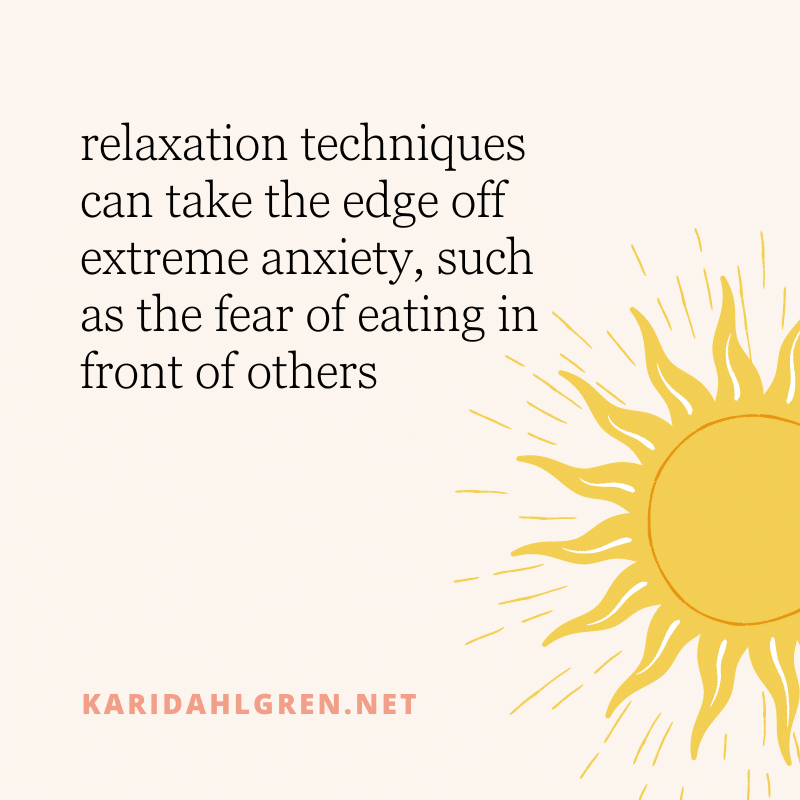
Mindfulness and relaxation techniques can also play a significant role in reducing anxiety related to eating in front of others:
- Practicing mindful eating: Mindful eating involves paying attention to the experience of eating without judgment. By focusing on the taste, texture, and enjoyment of food, anxiety can be reduced, and eating becomes a more positive experience.
- Deep breathing and relaxation exercises: Incorporating deep breathing or relaxation exercises before meals can help calm the nervous system and reduce anxiety. These techniques can be practiced anywhere, making them a practical tool for managing stress.
Build Self-Esteem and Body Positivity
Building self-esteem and fostering a positive body image are crucial in overcoming the fear of eating in front of others:
- Affirmations and self-compassion practices: Regularly practicing affirmations and self-compassion can help shift the focus away from external judgments and towards internal validation. Reminding yourself that you are worthy and deserving of enjoying meals in any setting can build confidence over time.
- Challenging societal standards of beauty and worth: It’s important to recognize and challenge the unrealistic standards of beauty and eating imposed by society. Embracing a more flexible and compassionate view of yourself can reduce the pressure to conform and alleviate social eating anxiety.
Finding Freedom at the Table
Breaking free from the fear of eating in front of others is not just about overcoming extreme anxiety; it’s about reclaiming your ability to fully enjoy your life. By understanding the roots of this fear and exploring the steps to overcome it, you’re taking a powerful step toward a more confident and connected life.
Whether it’s challenging societal expectations, practicing mindfulness, or seeking support through therapy, there’s a path forward that leads to more freedom and joy at the table. Remember, you’re not alone in this journey, and with the right tools and support, it’s entirely possible to turn mealtime from a source of stress into a source of comfort and connection.



